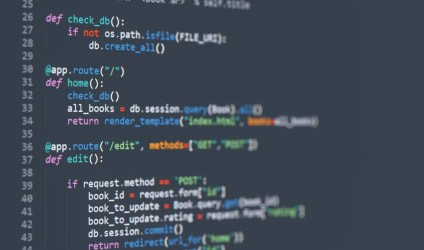The 10 Most In-Demand Coding and Programming Languages to Learn
Writer
Editor
Reviewer
Writer
Editor
Reviewer
BestColleges.com is an advertising-supported site. Featured or trusted partner programs and all school search, finder, or match results are for schools that compensate us. This compensation does not influence our school rankings, resource guides, or other editorially-independent information published on this site.
Find the program that's right for you
Learn new skills quickly with a bootcamp, or earn a degree from a traditional college.
Answer a few questions to get matched with a bootcamp that fits your needs.
Explore accredited colleges to get matched with the best program for you.
- You can choose from thousands of different programming languages to learn.
- Some languages are used only in one type of job, whereas others are broad and adaptable.
- You will likely need to learn more than one language, depending on your career goals.
- There are no wrong answers; each programming language comes with its own pros and cons.
The job market has seen many ups and downs over the last few years. But people who know how to code often have the best chances of weathering the storm. If you consider yourself someone who wants to learn this promising skill, it can be overwhelming to know where to start.
There are countless coding bootcamps and online classes out there that promise a flashy new career, but which one is worth investing your time and money in? The number one consideration is aligning the coding language with the end goal or career you want. If you don't know what you want to do yet or what your long-term goals are, you might find it hard to pick a coding language to learn.
While we can't decide for you, hopefully, we can at least help narrow down the options.
Most Popular Coding and Programming Languages Overview
- Java
- Python
- JavaScript
- PHP
- SQL
- Ruby
- C++
- C#
- Swift
- R
What Is a Programming Language?
Let's start with the basics. For how advanced computers have become over the years, we still run into the same problem — that computers and humans don't speak the same language. Computers understand binary, a series of zeros and ones. Trying to remember the difference between 10001 and 10011 can make a high school foreign language class look like a piece of cake. Programming languages serve as an intermediary between computers' ones and zeros and our human language. Imagine it like this: Say, for example, you wanted to communicate with a German woman, but neither of you spoke the other's respective language. However, then you realized you could both communicate by speaking Spanish.
The Most Popular Programming Languages to Learn
Java
Who It's For: Programmers who want to build applications for phones, computers, and scientific supercomputers.
Key Features: Java has become the standard language for creating apps across various platforms. It's versatile, uses English-like grammar, and comes with good documentation tools. Java is one of the older programming languages that's still incredibly popular, so it has good documentation and community support for those learning or using the language.
Companies That Use It: Airbnb, Google, eBay, Spotify, and Pinterest
Python
Who It's For: Python is often used in academia, including bioinformatics, biology, and mathematics, and by those working with AI and machine learning.
Key Features: Python is a high-level language that you can use for various purposes. It's open-source, easy to use, and easy to debug. It also supports both procedural-oriented and object-oriented programming, making it more versatile.
Companies That Use It: IBM, NASA, Pixar, Facebook, and Netflix
JavaScript
Who It's For: Front-end web developers looking to add levels of interactivity to webpages, applications, and browsers.
Key Features: JavaScript is a lightweight scripting language with a varied set of libraries. It is platform independent, offers rich interfaces, and provides extended functionality. When paired with node.js, it can also work with back-end development. Because of its versatility and many use cases, people use it as the primary tool to make websites interactive. If you work in web development, you'll likely use either JavaScript or one of its derivatives.
Companies That Use It: Facebook, Google, Microsoft, Paypal, and Instagram
PHP
Who It's For: Web developers primarily use PHP to create dynamic websites and applications.
Key Features: PHP can generate dynamic page content, collect and send cookies, and encrypt data. It is platform independent, secure, and fast. It can also be integrated with HTML, JavaScript, and XML.
Companies That Use It: Facebook, Wikipedia, Slack, MailChimp, and WordPress
SQL
Who It's For: Data scientists primarily use this language, as well as academics working with data sets.
Key Features: SQL offers flexibility and scalability for database management systems. It helps engineers retrieve data from databases, manipulate and define data, and execute queries against databases. It provides both a high degree of security and high-performance capabilities.
Companies That Use It: Adobe, Dell, Facebook, LinkedIn, and Microsoft
Ruby
Who It's For: Those interested in building web applications, building servers, and web scraping use Ruby.
Key Features: Designed with an emphasis on simplicity and productivity, Ruby is a high-level, general-purpose language. It features dynamic typing, four levels of variable scope (global, class, instance, and local), and a garbage collection. You can implement it across different platforms. Ruby is often used with Rails to create a web app development framework.
Companies That Use It: Airbnb, Fiver, Github, Groupon, and Netflix
C++
Who It's For: Programmers, developers, and coders use C++ to build operating systems and optimize browsers, libraries, and databases. Game developers also use C++.
Key Features: As an object-oriented programming language, C++ can make code clear and easier to read. It's an intermediate-level programming language that is less cryptic than other languages and more closely associated with human language. While the language is machine independent, it is not platform independent.
Companies That Use It: Adobe, Apple, Bloomberg, Microsoft, and Mozilla
C#
Who It's For: People use C# to develop desktop applications, game development, and web application creation.
Key Features: C# comes with a diverse and rich set of data types, functions, and libraries, making coding easy for developers of all skill levels. It's a modern programming language with automatic garage collection, error handling, and strong security features.
Companies That Use It: Alibaba Travels, Delivery Hero, Microsoft, and Stack Overflow
Swift
Who It's For: Swift is one of the most popular languages for developing Apple products. But you can also use it to create Swift libraries in either Windows or Linux.
Key Features: Swift was developed to make writing, maintaining, and debugging easier and more streamlined. It is extremely fast, has efficient memory management, and allows programmers to add various classes or values using the namespace identifier. It also supports dynamic libraries and executable pieces of code that can be linked to an app.
Companies That Use It: Airbnb, Apple, Facebook, LinkedIn, Lyft, Uber
R
Who It's For: You can use R with statistical computing and analysis, cleaning and importing datasets, and data visualization.
Key Features: R is a comprehensive programming language with various libraries. Comprehensive R Archive Network (CRAN) has more than 10,000 packages that offer a variety of functionalities. It's an open-source language that supports cross-platform compatibility. It comes with extensions for SQL and provides various data modeling and operation facilities.
Companies That Use It: Amazon, Google, Infosys, Meta Platforms, and Novartis
Other Notable Coding Languages
HTML and CSS
Who It's For: HTML and CSS provide the structure of websites and are essential knowledge for any web developer.
Key Features: Cascading Style Sheets (CSS) and HyperText Markup Language (HTML) provide the layout, spacing, colors, and fonts of websites. Overall, they provide the basic structures and allow developers to copy style aspects from one page to another so website pages have continuity. While not traditionally considered programming languages, they are required to make things appear on the web.
Companies That Use It: Every company that has a webpage
Which Coding Languages Should I Learn?
Choosing which programming language to learn can be daunting at first. What would you say if you had to guess how many programming languages are out there? Twenty? Two hundred?
According to the Online Historical Encyclopaedia of Programming Languages, there are actually about 8,945 coding languages. Many of these, though, are either not used very often or only in very specific contexts. If you are going to learn any programming language, there's a good chance you will start with one of the 10 most popular.
Which programming language you should learn highly depends on your goals and interests. To help, check out a breakdown of some of the most popular jobs and their associated skills.
Web Developer
Web developers create and maintain websites. Front-end web developers tackle the part of a website that is user-facing, including a site's design and usability. Back-end web developers handle all of the parts that you do not see, including data storage and security.
The most important languages for front-end web developers:
-
CSS -
JavaScript -
HTML
The most important languages for back-end web developers:
-
Python -
Java -
Ruby -
JavaScript
Data Scientist
Data is the new digital currency, and data scientists are the modern-day Rumpelstiltskin spinning data into gold. They figure out which questions need answering and how to find the information to answer those questions. They often work with statistics, machine learning, and data visualization.
The most important languages for data scientists:
-
Python -
SQL -
R -
JavaScript -
Java
Software Engineer
Software engineers identify user needs and then design, implement, test, and maintain software programs. This can include both commercially available software that you might interact with daily and industry software. They need a strong knowledge of programming languages, computer operating systems, and software development.
The most important languages for software engineers:
-
Java -
Python -
C++ -
Scala
Mobile App Developer
Mobile app developers create, develop, and maintain applications for mobile devices such as phones and tablets. This means that they often work with either iOS or Android. They assess and meet customer needs, fix bugs, and create clean, easy-to-use, and understandable code.
The most important languages for mobile app developers:
-
Java -
Swift -
JavaScript
Pros and Cons
| Name of Language | ||
|---|---|---|
| Java | It's reasonably straightforward, simple, and easy to learn. | Java is slow to program in and can be cumbersome. |
| Python | Python is one of the more accessible and flexible languages to learn. | Python requires a lot of memory and can be slower than other options. |
| JavaScript | It is faster and easier to use than many other languages and has various interfaces. | It has poor client-side security and can be hard to debug. |
| PHP | PHP comes with built-in database connections and powerful library support. | It's not one of the easier languages to use and has some security issues. |
| SQL | Its commands and keywords are all basic English words, like SELECT, UPDATE, and INSERT INTO. | It comes with a fairly difficult-to-use and complex interface. |
| Ruby | When combined with Rails, Ruby becomes fast and easy to use and requires less code than other languages. | It strictly follows standards and paradigms, making Ruby slow but much more flexible than other languages. |
| C++ | It can run on any platform, is a multi-paradigm language, and has a wide variety of uses. | It is difficult to master and slow to write. |
| C# | C# comes with many features that make it much faster to code and has higher scalability. | C# needs to be compiled after every change, making it slower and clunkier to use. |
| Swift | This language is user-friendly, has a simplified syntax, and is both fast and secure. | It is a newer language, so it has fewer support options and does not always work with third-party tools. |
| R | R is growing in popularity for machine learning and data management. | R is a complicated language with a steep learning curve. |
Frequently Asked Questions About Popular Coding Languages
What pays more, C++ or Python?
According to Payscale data, salaries for professionals with C++ programming skills average $93,000 a year as of December 2022. Payscale reports that Python developers earn an average of $79,400 a year as of November 2022. Location, experience, and the size of the company might influence salary more than the particular language. But, overall, C++ developers seem to earn slightly more than Python developers on average.
Can I get a job if I know C++?
Absolutely. C++ is a popular language, so there are often many companies hiring C++ developers. Some employers may prefer that you have other technical skills, too. But having a good understanding of C++ can help you get a job as a programmer, software developer, quality analyst, game programmer, or C++ analyst.
Should I learn Java or Python?
Which language you should learn depends on your goals. Java is more useful for web, cloud, and Android app development. And Python is more useful for those working in data science, machine learning, and back-end development. If you want to learn both, it might be easier to start with Python, as it's usually easier for people to pick up.
Feature Image: COROIMAGE / Moment / Getty Images
Explore More Bootcamps Resources
View all
The Ultimate Guide to Programming Languages

The Easiest Programming and Coding Languages





